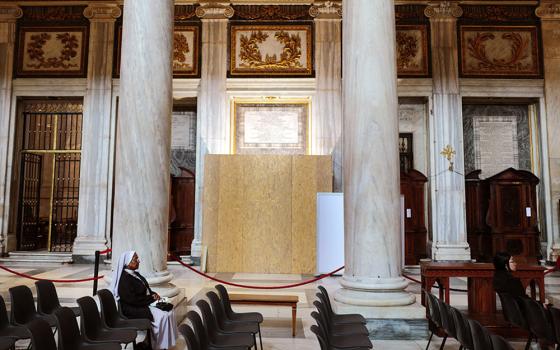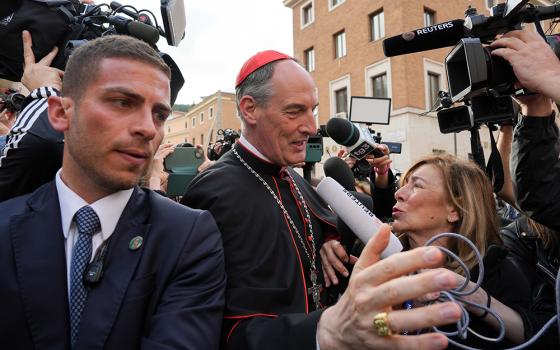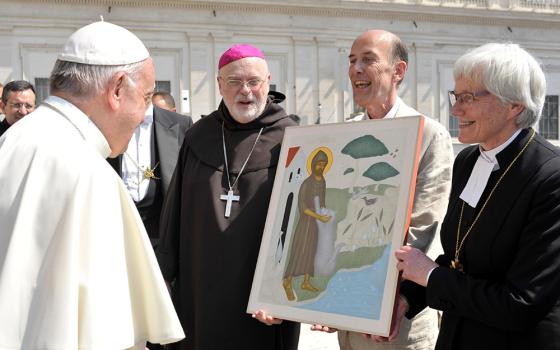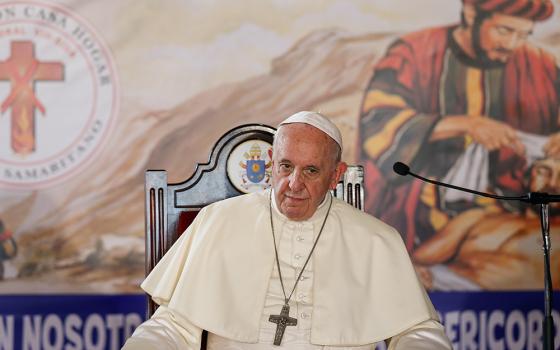
Sr. Kate Kuenstler of the Poor Handmaids of Jesus Christ, left, seen with St. Joseph Sr. Christine Schenk, receives FutureChurch's Rev. Louis J. Trivison Award in fall 2012. (Courtesy of FutureChurch)
Sr. Kate Kuenstler, a longtime canonical advocate for the rights of laity in the church, entered into eternal life Oct. 28 after an extended illness. She was 70.
I was privileged to represent the church reform/renewal community and countless laity at her wake and funeral Nov. 1 and 2.
The Gospel passage chosen by Kate's Poor Handmaids of Jesus Christ sisters well describes her influential yet unobtrusive leadership: "Jesus went on to say, 'What is the kingdom of God like? To what shall I compare it? It is like yeast a woman took and mixed in with three measures of flour till it was leavened all through' " (Luke 13:18, 20-21).
Kate's pastoral service was powerful leaven to the thousands of Catholics she served, first as an educator and then as a canonical advocate for laity in the church.
Mary Kathleen Kuenstler was born Jan. 21, 1949, in St. Louis and was adopted by Lawrence and Lorraine (Buerster) Kuenstler. Inspired by the Poor Handmaids who taught her in elementary and high school, Kate joined the Donaldson, Indiana, community in 1967, professing vows in 1970. After teaching elementary school for a time, she received a master's degree in religious education and subsequently served as director of education and diocesan consultant in the Illinois dioceses of Springfield and Belleville.
Asked by her community to pursue studies in canon law, Sister Kate received a licentiate and doctorate in canon law from St. Thomas Aquinas Pontifical University in Rome in 1992. She served several stints as a marriage tribunal judge before deciding to open her own practice as an independent canon lawyer with a special focus on the rights of the laity.
I well remember when I first met her. It was May 2007, and I was sitting in a pew at the Church of the Resurrection in Solon, Ohio, listening to her passionate presentation on "Canon Law and the Rights of the Lay Christian Faithful." It made my heart leap and sent shivers down my spine.
The FutureChurch board had just approved a new Save Our Parish Community project to provide support and canonical resources to parishioners whose vital, solvent parishes were threatened with closure.
We had watched in horror as prelates in Boston, the epicenter of the clergy sex abuse crisis, summarily closed 65 vital parishes in that archdiocese despite parishioner vigils and nonviolent sit-ins that continued for years. As we suspected — and the archdiocese confirmed in 2008 — Boston churches had been closed and sold to help pay clergy sex abuse bills.
Advertisement
We knew that if Boston succeeded in suppressing parishes and selling off churches, it was only a matter of time before many (if not most) other U.S. dioceses would follow suit. Parish downsizing solved two problems for U.S. bishops: First, there were not enough priests to staff their parishes; and second, most dioceses desperately needed money to pay legal fees resulting from clergy sex abuse lawsuits.
FutureChurch's Save Our Parish Community effort provided canonical resources to help Catholics resist unjust church closures. But we needed someone who knew canon law and who felt strongly about the rights of the laity.
As I sat and listened to Kate, I knew we had found that person.
Over the next 12 years, Sister Kate helped hundreds of parishioners file appeals to save their parish churches. When she began, national priest leaders told us there was little to no chance of winning.
But, to paraphrase a popular African American expression, Kate's creative use of canon law "made a way where there was no way."
Her tireless defense of the canonical rights of the laity changed Vatican policy from automatically accepting U.S. bishops' decisions to close and sell vibrant churches to one that preserves those churches as worship sites instead. Thanks to her efforts with FutureChurch, at least 38 churches (to date) won their appeals and are still in existence after being threatened with closure.
In 2012, she received FutureChurch's Rev. Louis J. Trivison Award for her prophetic service.
She blazed a trail for other canon lawyers to follow. Her pioneering work is chronicled in the award-winning 2017 documentary "Foreclosing on Faith," which details parish appeals in New York City, Cleveland and Boston.
A client from the New York Archdiocese, Kalman Chany, describes Kate as a "consummate professional whose clients always knew that every possible avenue was pursued on their behalf. She was not only an advocate, but also a dear friend who will be greatly missed."
Several parishioner appeals from the New York Archdiocese are now pending at the Vatican.
Bob Kloos, who helped organize Cleveland parish appeals in the early 2010s and now serves as pastor and administrator of Cleveland's Community of St. Peter, shared this reflection about his experience of working with baker-woman Kate as she gently kneaded in the yeast so necessary for the rising of the people of God:
Kate was there for the little people. For all the baptized. She was a servant first and foremost. What else could a professed Poor Handmaid be? She listened to their heart and she understood. She was accustomed to their disillusionment when they wrote, called or showed up at her door. She would help. She would hope. She would heal. And often, she would win.
She responded to the chaos by introducing order. She answered the desperate calls with unrelenting peace. She encouraged the disheartened while she researched the details, strategized a defense and crafted a reply. It was always about the law, but she supplied equal amounts of compassion, consolation and encouragement wherever it would serve.
Bishops she tangled with should have known better than to try to go around the law. She was patient with them, but firm. They should have known that bold is never a substitute for love, and she hoped that every decision rendered on behalf of the lowly would teach a valuable lesson to those who needed to learn.
Even when the bishop lost, the church was served.
A great woman has earned her eternal rest. Others will have to step up now. But they will have to do so with precision, perseverance and perfect clarity if Kate's legacy is to endure. The poor will still need and deserve what Kate provided, willingly and without reserve.
There is no better way to honor Kate than to imitate her commitment to her calling — you to yours. There is still much work to be done.
[St. Joseph Sr. Christine Schenk, an NCR board member and columnist, served urban families for 18 years as a nurse midwife before co-founding FutureChurch, where she served for 23 years. Her recent book, Crispina and Her Sisters: Women and Authority in Early Christianity, was awarded first place in the history category by the Catholic Press Association. She holds master's degrees in nursing and theology.]








